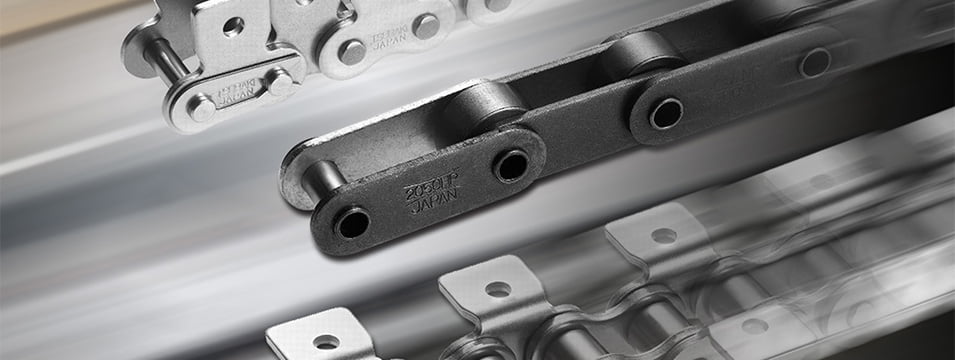Chain of innovations helps put Tsubaki at the forefront of technology
MRO professionals see the real-world effects of technological innovation. In some instances this can lead to reduced working pressures, while in others they can be left to (literally) pick up the pieces. Over many years, chain maker Tsubaki has consistently worked to improve the life of MRO professionals. Its chain offers improved performance and reliability in most industrial applications; over 100 years it’s produced a stream of innovations that regularly reset the benchmarks for the technology.
Tsubaki was founded in Japan 100 years ago and has always maintained a focus on research and development of its products. It not only meets the ever changing needs of the marketplace, but predicts future requirements and works proactively to anticipate these. It also continuously modernises its production facilities and has developed enviable green credentials.
BS/DIN GT4 Winner chain is hailed as the most advanced chain available. It is an enhanced BS/DIN European premium chain, derived from fourth generation developments in chain design. Key design features include a grooved bush to hold lubricant near the point of contact; seamless bushes with precise cylindrical profile; centre sink rivets for easy disassembly; and a ring coined connection link to ensure transmission capacity. The product is available in chain sizes from RF06B up to RS48B in simplex, duplex and triplex versions.
One of Tsubaki’s key innovations was the development of lube-free chain. Tsubaki’s Lambda chains were the first in the industry to use oil-impregnated sintered bushes. Launched in 1988, they have become the de-facto chain choice for many applications, and many variations have been developed, including extreme temperature versions and food safe options with a food grade lubricant supplied as standard.
Lambda also runs clean thus reducing the risk of contaminating products, machines, work space areas etc. Further the detailed design of the chains components makes assembly and disassembly simple and fast, so that machine stoppages are minimised. Importantly Lambda is interchangeable with many other chain types; thus machinery can benefit from a significant upgrade in performance simply by changing to Lambda.
Chain is often required to perform in extreme environments and Tsubaki has addressed this by developing Neptune. All Neptune components, link plates, bushes and bearing pins have undergone a special surface treatment process that creates two layers of protection for maximum resistance against acids, alkalines, other harsh chemicals, seawater, acid rain and adverse environmental and climatic conditions. The surface treatment also protects Neptune chain’s rollers against contact wear and damage when in use under great load or at high speed.
Significantly, Tsubaki has developed the Neptune treatment process so that the chain does not contain any chemically hazardous substances such as hexavalent chromium, lead, cadmium or mercury. Further, the power ratings are the same as those of the corresponding Tsubaki BS, enabling easy upgrade to Neptune when retrofitting existing machinery. Neptune chain can also be combined with Lambda technology to harvest the benefits of both products.
As well as chains manufactured to BS, DIN and ANSI specification Tsubaki also makes PC and stainless steel chains, which are particularly useful in applications in marine and other corrosive working environments. So for operations that require sanitary conditions, exposure to corrosive chemicals, to extreme temperatures that run outdoors, where moisture or sea air is present, Tsubaki has specially designed and tested chains that will provide a long and trouble free operating life and contribute to productivity and profitability.
Long life replacements
MRO engineers tend to be understandably wary of unsubstantiated claims of innovation and improvement, so like to see to real world proof. Tsubaki has many retrofit projects that illustrate one or more of the benefits of its chains.
For instance, global warming and the wetter climates it brings is of great concern to water and environment engineers working in places like the UK’s Norfolk Broads and Somerset Levels – and further afield in the Low Countries, the Mississippi Delta, Bangladesh, and upland areas dealing with increasing glacial melt. These engineers must be confident their sluices and other flow controls and flood defences will work reliably when call upon. Many are swapping to Tsubaki lube-free chains which have a track record of reliability even if they are unattended for long periods.
Sawdust is one of the best materials for ‘gumming up’ machinery. It can find its way into all sort of moving parts and soak up lubrication, cause blockages and generally create problems. When a tissue manufacturer was having similar problems with paper dust on a log saw accumulator Tsubaki engineers recommended a switch to Lambda chain, which produced immediate improvements on several fronts. The chain remained flexible and free running, allowing continuous operation for far longer, thus improving productivity. With no need for regular relubrication there were significant cost savings, while the elimination of contamination improved product quality.
In the rather different engineering world of medical equipment such as CT scanners, MRI units and X-ray machines, powered drive systems are used to lift, transfer, tilt or rotate sections of the equipment or the patients themselves. These movements must be precise and repeatable whilst the equipment must be both quiet and ultra reliable. Tsubaki supplies many of the world’s leading manufacturers of such equipment with lube-free chains for such applications, often working with the manufacturers to develop bespoke chain or special attachments that meet their needs entirely.
Chain is universal, and its simplicity means virtually everyone can understand the basics of how it works. However, it is a mistake to see it as a commodity, a fully developed technology that can be produced by many manufacturers. The reality is far from that: while there are cheap and cheerful, me-too chains available, they offer relatively low performance and poor longevity and are not suitable for applications that are in anyway demanding.
As Tsubaki has shown – and continues to show – chain is a technology that keeps on developing and adapting to meet new and emerging needs and expectations. As a rule, selecting the best chain for a given application can add value to the host machinery and its operation in a manufacturing process, thus helping to improve production and reduce maintenance costs. Further, Tsubaki is always happy to review demanding applications to see if one of its existing high-performance chains offers a good solution or maybe even develop an innovative new chain to address such real-world needs.




